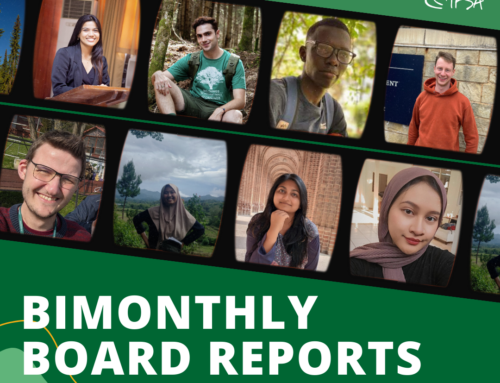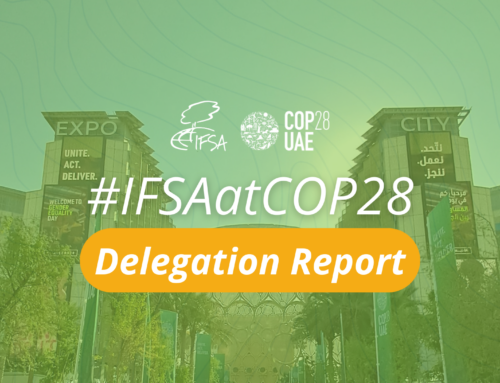The seventh session of the Intergovernmental Science-policy Platform on Biodiversity and Ecosystem services (IPBES 7); was the first Science-policy interface conference I ever attended! I was one of International Forestry Student Association delegation. It is my most memorable experience!
IPBES aims to assess the state of biodiversity and of the ecosystem services it provides to society. Therefore, a big part of IPBES 7 was to lauch the global assessment report on biodiversity and ecosystem services, which is the first intergovernmental report of its kind. IPBES 7 held from 29 April – 4th May 2019 at UNESCO building, Paris France. It started with the stakeholder day and several plenary sessions and specialized meetings called working groups were held to achieve the agenda of the event.
On the first day, the plenary session began with regional opening speeches, the regional speeches was an opportunity for the regions to state what they were expecting from IPBES 7. I observed that in addition the regional speeches were also framed to reflect their economic and political power, their culture and some talk about why they are important and maybe the best in biodiversity and conservation. But, interestingly all regions stated that building capacity of young people is important. The plenary also announced the candidates nominated to join the IPBES Bureau and Multidisciplinary Expert Panel (MEP), the nominees were mostly men. I was happy when member states agreed to consider working towards having gender based committees and this was achieved at the end of the IPBES 7.
As the session continued on Tuesday to Friday, each region met before the morning sessions to review the previous day, and discuss their proposed negotiations for the day (I joined the African group meetings and from my experience with the African group). The working groups – global assessment and Future Work program of IPBES worked concurrently to make efficient use of time. During the sessions, when negotiations are prolonged, the chair asked all members states who are interested in the sentence to form “friends of the chair committee” and decide how the sentence should be rephrased during lunch. The most contentious topic was indigenous people and local community rights. Each day started at 7.00 am and ended pass midnight.
On Saturday, the panel joy filled the room as the plenary adopted the global assessment and the brief for policy makers! In my opinion, it was achieved due to the hard work of the thousands of experts that contributed to the global assessment. And also, the commitment of the representatives of the member states, IPBES secretariat and technical staff and the Chair.
The fun part of this experience was the youth network at the conference, on arrival at the conference venue on the 28th April, 2019; I met delegates from Young Ecosystem Services Specialists (YESS). I joined the group in facilitating discussions during the stakeholder day networking lunch; we had sessions with different country delegates and specialists. We also visited the roof top garden project in Paris and had a tour of the urban forest projects around Paris.
Take Away(s)
- I learnt how to detect the underlining meaning of sentences in policy documents.
- There is need for scientists to ensure traceability/ accuracy of references of facts
- Although, IPBES was not intended to be policy prescriptive, it negotiations of the member states reflected salient points important in rephrasing scientific findings for policy action.
- There is need for policy makers, civil society actors and scientists to discuss in a platform such as IPBES because it will increase the chances of the uptake of latest scientific information.
- Transformative change needed to restore and protect nature requires the inputs of different sectors – it will also depend on the activities of forest resource managers beyond national policies. Hence, it is important to invest in the capacity building of young foresters
- If you intend represent your international platforms such as IPBES, there is need to start developing your professional expertise including public communication and policy literacy.
- Young people can join the Open-ended Network of IPBES stakeholders to contribute to future global assessment on biodiversity and ecosystem services.
I greatly appreciate IFSA for giving me the opportunity to attend IPBES 7. My sincere gratitude to IFSAUBC and MasterCard Foundation Scholarship UBC for providing the funds for my travels
Writer: Oloruntobi Muniru
Pictures




